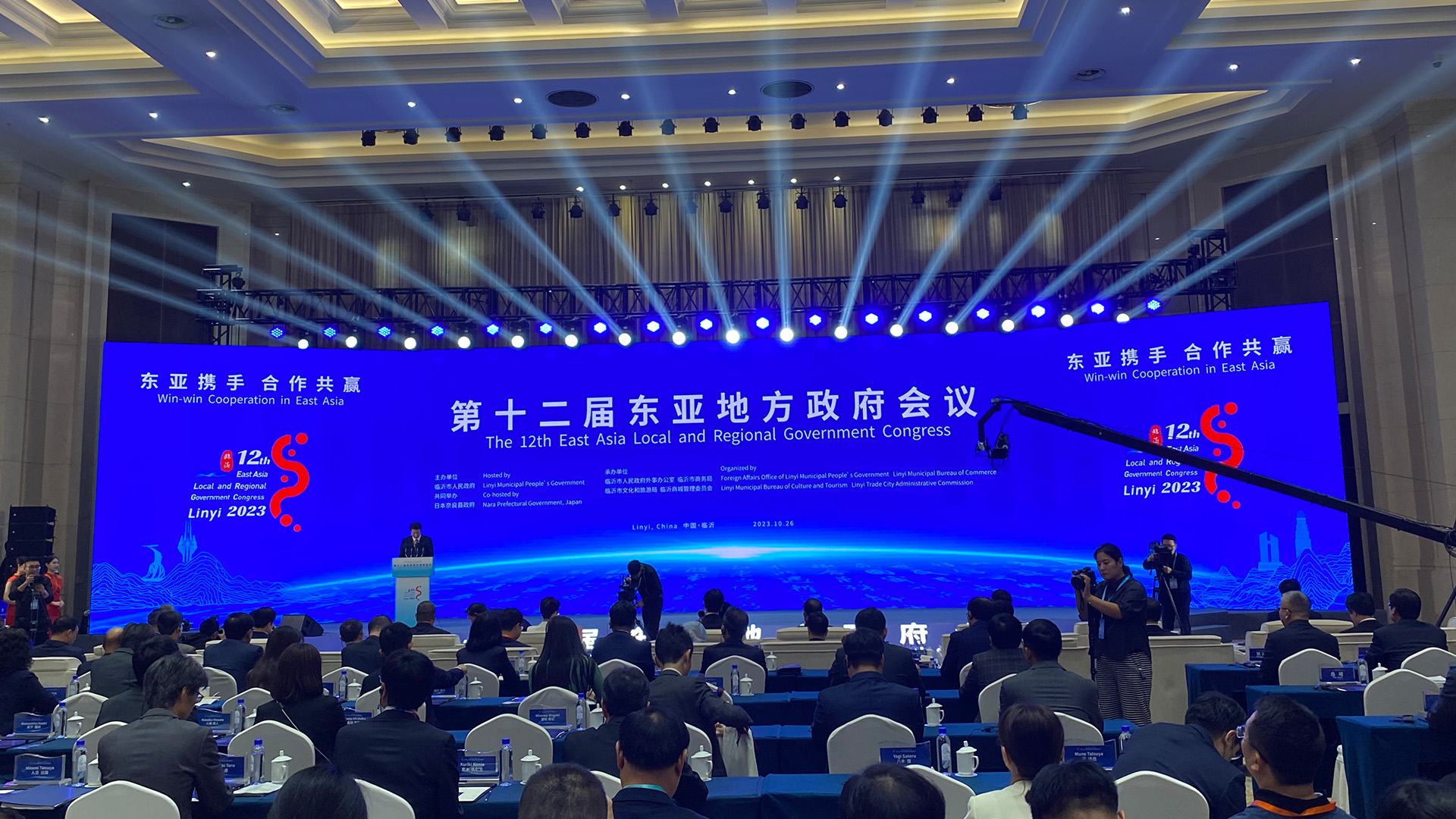Conference promotes exchanges between local governments in East Asia

[ad_1]
A conference to boost cooperation between local governments across East and Southeast Asia took place in Linyi, eastern China’s Shandong Province on Thursday, where an initiative was adopted as a guideline for further exchanges.
Under the theme “Win-win Cooperation in East Asia,” the 12th East Asia Local and Regional Government Congress gathered representatives from China, Japan, South Korea, Vietnam and Indonesia.
“Although the development of bilateral and multilateral relations between East Asian countries has sometimes experienced twists and turns, and encountered difficulties and challenges in recent years, friendly exchanges between local governments in East Asia have never been interrupted,” said Yin Daqi, counselor of the ministry’s Department of Asian Affairs, stressing the importance of such communication mechanism.
Yin added that Chinese Foreign Ministry has actively supported local governments to carry out exchanges and mutual learning with peers in other countries to achieve complementary advantages.

Makoto Yamashita, governor of Japan’s Nara Prefecture, delivers a speech at the opening ceremony./CGTN
Makoto Yamashita, governor of Japan’s Nara Prefecture, delivers a speech at the opening ceremony./CGTN
First initiated in 2010 by Japan’s Nara prefectural government, the congress aims to promote peace, stability, and common development in the region. It now includes 76 member governments at different levels from seven countries.
“This year also marks the 45th anniversary of the signing of the Treaty of Peace and Friendship between Japan and China. In this memorable year, this conference is held here in Linyi, China. I would like to express my gratitude and respect,” said Makoto Yamashita, governor of Nara Prefecture while addressing the opening ceremony.
He added that as the world is becoming increasingly chaotic, cooperation between local governments at the grassroots level has become extremely important, citing the Russia-Ukraine conflict and the conflict between Israel and Palestine.
A major topic for this year is the Regional Comprehensive Economic Partnership, or RCEP, which is widely expected to promote further connectivity in the region. The economic pact took effect in January 2022, covering most of East and Southeast Asian countries.

A roundtable discussion focuses on low carbon and green development. /CGTN
A roundtable discussion focuses on low carbon and green development. /CGTN
Linyi is one of the cities that have benefited from this pact. Data from the local government shows that in 2022, the city’s import and export trade volume with RCEP member countries reached about 87.9 billion yuan (around $12 billion), a year-on-year increase of 36.4 percent.
“We will take the conference as an opportunity to deepen cooperation with local governments, non-governmental organizations, universities and think tanks of the RCEP member countries in the fields of investment and trade, tourism and people-to-people exchanges,” Zhang Jian, head of the Foreign Affairs Office of the Linyi government, told CGTN.
Linyi is also the home of ancient China’s celebrated calligrapher Wang Xizhi and strategist Zhu Geliang. Zhang said they’ll also take advantage of the city’s profound historic resources to promote cultural exchanges.
In a roundtable discussion attended by governors and mayors, participants shared experiences and insights on achieving high-quality, green, low-carbon development.

Business representatives sign cooperation contracts at the conference. /CGTN
Business representatives sign cooperation contracts at the conference. /CGTN
The event also witnessed the signing of more than 30 business cooperation contracts with a total investment of 15.5 billion yuan, covering agriculture, new material, trade and tourism.
“Tourism is the main industry of Nara prefecture. We’ve welcomed a lot of Chinese tourists both before and after the pandemic, and we feel grateful for that,” said Nomura Tatsuho from Nara’s foreign affairs department.
He added that Nara and northwestern China’s Shaanxi Province are sister cities, and they hope to deepen exchanges with more places by forming such friendly relations.
The gathering also adopted what’s known as the “Linyi Initiative,” which includes resource sharing, low-carbon development, high-tech innovation, cultural diversity and reform and opening up.
“China will continue to uphold the principles of openness, inclusiveness, mutual benefit and win-win, continue to expand high-level opening up to the outside world, and contribute more positive energy to the strong, sustainable, balanced and inclusive growth of the world economy with its own high-quality development,” said Chinese diplomat Yin.
[ad_2]
Source link


